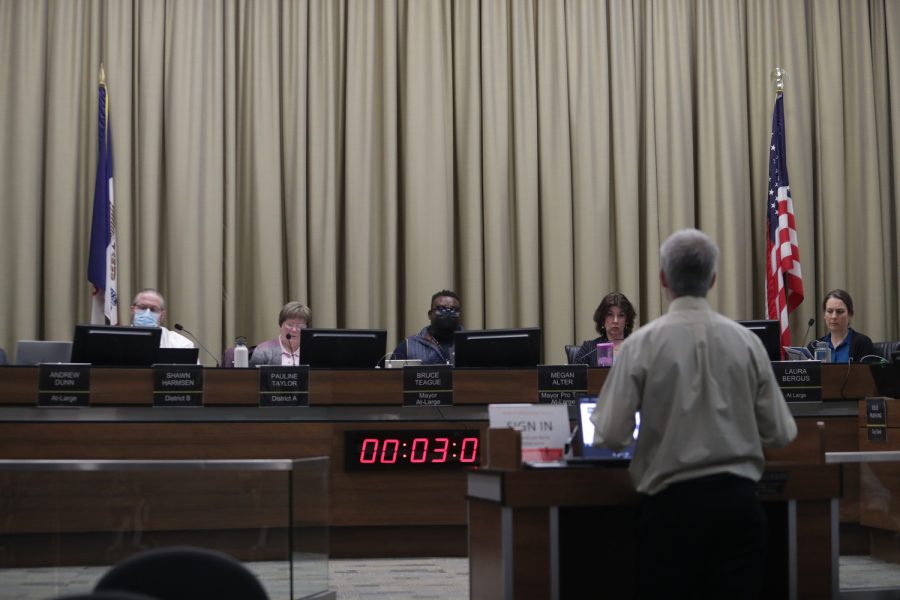Opinion | Restructure the Iowa City Police Department
Iowa City has a lot of benefits to be seen by restructuring our police department.
Iowa City Council holds a meeting in Iowa City on Tuesday, March 7, 2023.
April 16, 2023
Iowa City City Councilor Laura Bergus proposed an amendment to freeze the Iowa City Public Safety department’s budget at its 2023 amount and shift the proposed increase to a general reserve fund for alternative safety initiatives. The amendment failed after hours of debate.
While a more specific plan for the allocated money is a good idea, the allocation of police budget money into alternate safety initiatives — like sending mental health professionals instead of armed officers — is a necessary step for a safer and more equitable Iowa City. Bergus should re-propose a similar amendment or budget in future years with a more detailed plan.
The Iowa City strategic plan from 2023-28 specifically states that the city has a goal to “implement and expand innovative public safety models and facilities to improve outcomes and relationships within the community.” Passing an amendment like Bergus’ would certainly propel the city toward achieving that goal.
There are a handful of viable options Iowa City could choose from. In December 2020, Iowa City structured a proposition that has made significant progress. Following the tear gassing and pepper spraying by the Iowa City Police Department in summer 2020, the city council laid out a plan to restructure the police.
Since then, Iowa City has taken several steps in the right direction, including more support for people experiencing homelessness and increased funding for mental health first responders.
One of the reasons the amendment did not pass was because of the lack of specificity as to where the reallocated money would go. Mayor Pro Tem Megan Alter said she did not want to use the money for an undetermined project and that the amendment was well-intended but rushed.
Another concern was brought up by Police Chief Dustin Liston, who stated that the department has been understaffed and many officers have worked overtime as a result.
If increased funding to combat this problem is necessary, then so be it. But the city council should still create a budget that puts more money to alternate safety initiatives and prioritize using those services.
Restructuring the police department is done with a specific goal: prioritizing peace and safety and avoiding escalation and violence. There is no reason to use resources to be tough on crime when it happens instead of preventing it in the first place.
The tough on crime approach has been a colossal failure across the country. In Iowa, incarceration rates have skyrocketed since the tough on crime policies of the 1980s and the 1990s, according to the Prison Policy Initiative.
The best approach to many safety concerns that deal with individuals experiencing mental health-related issues is to de-escalate and assist the person rather than punish them and drive them deeper into a crisis.
There is a potential financial incentive to restructure the police. The town of Eugene, Oregon, sends medics and crisis workers to 911 and non-emergency calls and have saved millions of dollars that would have been spent had it sent these people to the criminal justice system instead.
Simply put, it’s not that the police don’t do necessary work, it’s that not all the work they do has to be done by someone with a badge and a gun. Iowa City has the chance to be a success story on the balance of police with other public safety approaches, and we should by all means take it.
Columns reflect the opinions of the authors and are not necessarily those of the Editorial Board, The Daily Iowan, or other organizations in which the author may be involved.



